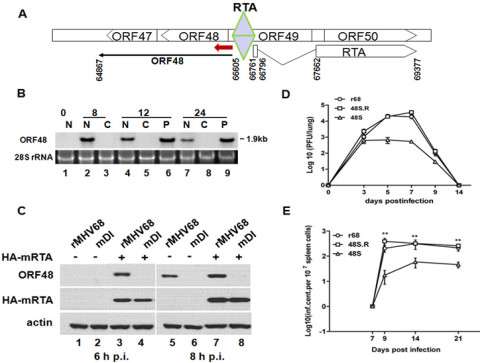
Kaposi’s sarcoma-associated herpesvirus (KSHV) and Epstein-Barr virus (EBV), members of the gamma subfamily of the Herpesviridae, are etiologically associated with human malignances such as lymphoma and nasopharyngeal carcinoma. However, studies on KSHV or EBV had been severely hampered by the lack of efficient de novo lytic infection system and suitable small animal models. Murine gammaherpesvirus 68 (MHV-68), also a member of the gammaherpesvirus subfamily, is genetically and biologically closely related to KSHV and EBV and has served as an excellent model for studying its human counterparts in recent years.
Viral lytic replication is a critical pathogenic step in the development of gammaherpesviruses-related diseases. Virus-encoded Replication and Transcription Activator (RTA) acts as a “molecular switch” for the life cycle of gammaherpesviruses by initiating viral lytic replication and activating transcription of downstream genes. However, how RTA activates viral lytic genes and the functions of many lytic proteins are poorly understood.
Dr. DENG Hongyu’s group at the Institute of Biophysics of Chinese Academy of Sciences has identified ORF48 as an RTA responsive gene of MHV-68 and showed that RTA activates the transcription of ORF48 by binding directly to a mapped RTA-responsive element in the ORF48 promoter (named 48pRRE) in vitro and in vivo. Through site-specific mutagenesis, the researchers generated an ORF48-null virus and showed that ORF48 is important for viral replication in culturing cells. Furthermore, through intranasal or intraperitoneal infection of laboratory mice, Dr. DENG’s group showed that the ORF48-null mutation remarkably reduced viral lytic replication in the lung, viral latent replication in the spleen and reactivation efficiency.
The study entitled “Murine Gammaherpesvirus 68 ORF48 Is an RTA-Responsive Gene Product and Functions in both Viral Lytic Replication and Latency during In Vivo Infection” was published online in Journal of Virology and has been selected as a “JVI Spotlight Feature”. The editor of JVI commented, “These findings provide insights into the transcriptional regulation and protein function of MHV-68, a desired model for studying gammaherpesviruses.”
The study was supported by grants from the National Natural Science Foundation and the Ministry of Science and Technology (973 Program) of China.

Figure: As an RTA-responsive gene product, ORF48 plays important roles in viral replication in both culturing cells and laboratory mice. (Image by Dr. DENG Hongyu's group )

86-10-68597521 (day)
86-10-68597289 (night)

86-10-68511095 (day)
86-10-68512458 (night)

cas_en@cas.cn

52 Sanlihe Rd., Xicheng District,
Beijing, China (100864)

